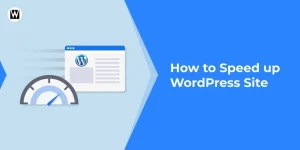WordPress vs Squarespace Which Platform to Choose
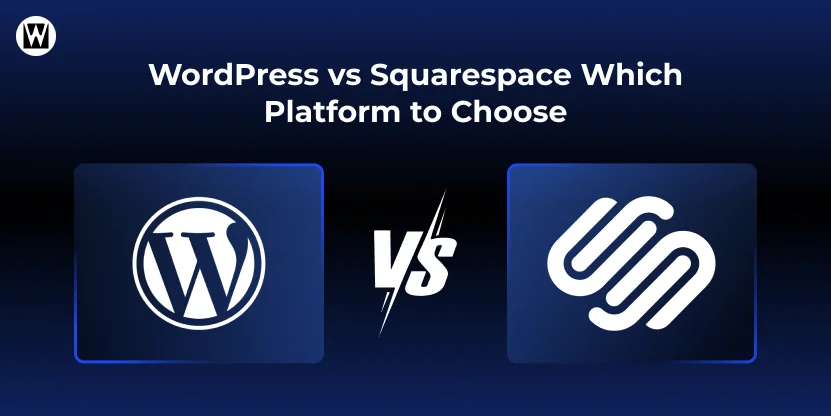
The eCommerce world is growing fast. Global online sales are expected to exceed half a trillion U.S. dollars by the end of 2024, with projections reaching a mind-blowing $58.74 trillion by 2028. As more entrepreneurs jump into online business, the demand for scalable, flexible website builders is at an all-time high.
Two major players in this space are WordPress and Squarespace. Both platforms are powerhouses in web design, but they approach things differently. If you’re trying to decide between WordPress vs Squarespace for your online store or business website, the choice can feel overwhelming.
No worries, though—we’ve got your back. In this guide, we’ll break down the key differences between WordPress and Squarespace to help you determine which is best for your needs.
Brief About WordPress and Squarespace
WordPress
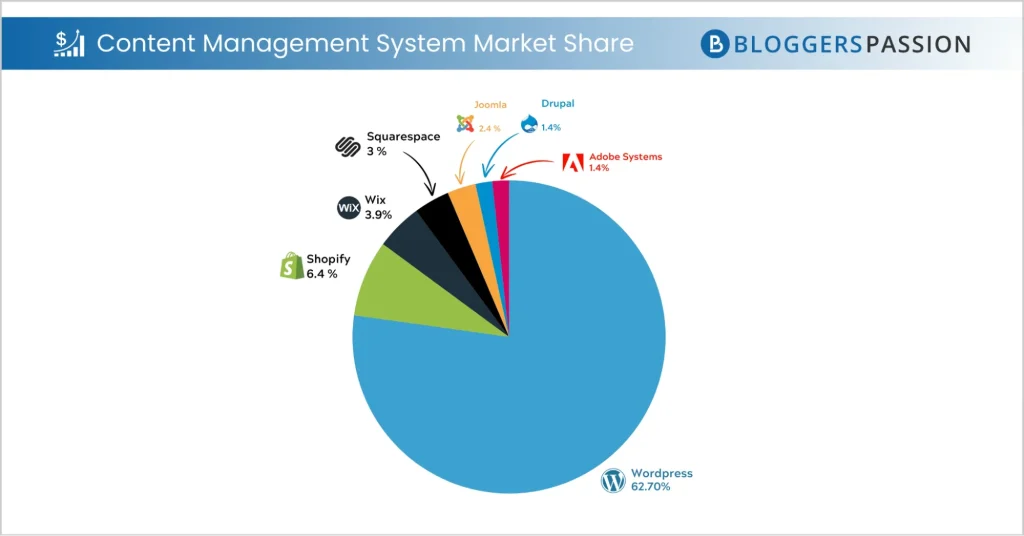
Source: BloggersPassion
WordPress is a content management system (CMS) that powers over 40% of the web. It’s incredibly flexible and customizable, making it a popular choice for businesses of all sizes. Whether you want to build a blog, a portfolio, or a full-fledged online store, WordPress has the tools to help you do it. WordPress lets you create virtually any website, from themes and plugins to custom code.
Squarespace
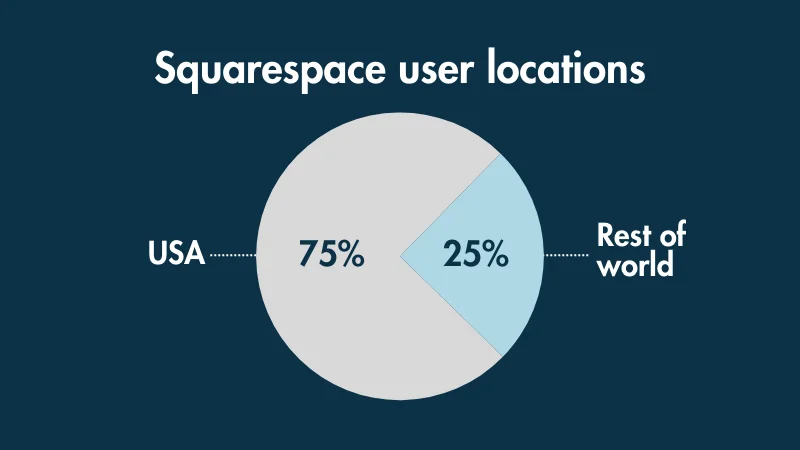
Source: Style Factory
Squarespace is an all-in-one website builder focusing on simplicity and ease of use. It’s perfect for people who want a beautiful, professional website without needing to learn code. Founded in 2003, Squarespace started as a blog hosting platform but has since evolved into a robust platform for creating websites and online stores. With its stunning templates and drag-and-drop functionality, Squarespace is ideal for beginners and those who prefer a hands-off approach.
WordPress vs Squarespace at a Glance
Before a deeper comparison, here’s a quick overview of some significant differences.
| Feature | WordPress | Squarespace | ||
|---|---|---|---|---|
| Ease of Use |
|
| ||
| Design & Customization |
|
| ||
| Learning Curve |
|
| ||
| Content Ownership and Data |
|
| ||
| Plugins |
|
| ||
| Responsiveness |
|
| ||
| Costing Structure |
|
| ||
| Security |
|
| ||
| Support & Maintenance |
|
|
This table provides a quick comparison of both platforms, giving a clear snapshot of their strengths and weaknesses across these key features. Now, let’s dive deeper into each one, where we’ll compare the features more comprehensively and declare a winner after each section.
Key Differences Between WordPress & Squarespace
To choose the best website platform, it is essential to understand what each eCommerce option offers. You would not purchase a car without comparing it to multiple models, right? So, think about the website platform you choose in the same way!
Both WordPress and Squarespace have facets worth exploring, so let’s talk about the most notable specifics.
1. Ease of Use
WordPress: WordPress gives you complete control but has a steep learning curve. Think of it like buying a car in pieces—you can assemble it however you want, but it requires a lot of work. You’ll need to choose a hosting provider, install plugins, and tweak themes, which might feel overwhelming for beginners.
Squarespace: Squarespace is more like buying a pre-assembled car. You don’t need to know anything about coding or design to get started. The drag-and-drop interface is super intuitive, so you can focus on creating great content without worrying about the technical stuff.
Winner: Squarespace
2. Design and Customization
WordPress: If customization is important to you, WordPress is the place to be. It offers a vast library of free and premium themes, plus thousands of plugins to extend your site’s functionality. If you are adventurous, you can tweak the code, add custom CSS, and even build your own themes. It’s like having a blank canvas—you can create whatever you want, but it requires time and effort.
Squarespace: Squarespace, on the other hand, offers stunning, pre-designed templates that look polished and professional right out of the box. You can change fonts, colors, and images, but you can only customize the overall design so much. It’s great if you need a beautiful website fast, but it’s not ideal if you want complete control over every detail.
Winner: WordPress
Want to Build Better WordPress Websites?
3. Learning Curve
WordPress: WordPress can feel like a full-time project at first. With plugins, themes, and advanced customization options, it takes time to learn how everything works. But once you get the hang of it, you’ll have total control over your site.
Squarespace is much easier to learn. Its user-friendly interface allows you to start building your site immediately without needing a degree in web design.
Winner: Squarespace
4. Content Ownership and Data
WordPress: One of the best things about WordPress is that you own everything—your content, data, and hosting. You’re in control, which means more freedom but also more responsibility. You’ll need to handle updates, security, and backups yourself.
Squarespace hosts your website, which means it controls your data. While Squarespace handles security and backups, you’re a bit more restricted. If Squarespace were to shut down (which is highly unlikely), you could lose access to your site.
Winner: WordPress
5. Plugins
WordPress: WordPress has an extensive library of over 59,000 plugins to extend the functionality of your site. From SEO tools to eCommerce features, you can add any feature you want. If you need something custom, you can even build your plugins.
Squarespace: Squarespace offers built-in integrations and third-party apps but fewer options than WordPress. This could be a dealbreaker if you need advanced functionality or a specific integration.
Winner: WordPress
6. Mobile Editing & Responsiveness
WordPress: While WordPress themes are responsive (meaning they automatically adjust for mobile devices), editing your site on mobile isn’t as smooth or intuitive. You might need to tweak settings manually for the best mobile experience.
Squarespace: Squarespace excels at mobile responsiveness. All its templates are mobile-friendly, and you can easily manage and edit your site on the go using its mobile app.
Winner: Squarespace
7. Pricing
WordPress: Although WordPress is free, you must pay for a domain and hosting. The costs can increase over time, depending on your needs (premium themes, plugins, security).
Squarespace: Squarespace has a transparent pricing structure, with plans starting at $12 per month (billed annually). The subscription includes everything you need, so there are no surprises.
Winner: Tie
8. Security
WordPress: WordPress security depends on the hosting provider and plugins you choose. While there are plenty of security options, you must keep your site safe by applying updates and using trusted plugins.
Squarespace: Squarespace handles all security updates for you. Since it’s a closed platform, there’s less chance for vulnerabilities. Squarespace also backs up your site, so you don’t have to worry about maintaining backups.
Winner: Squarespace
9. Maintenance and Support
WordPress: WordPress has a massive support community, including forums, tutorials, and documentation. However, you’ll have to handle most maintenance tasks, like updates and backups.
Squarespace: Squarespace offers 24/7 customer support, a helpful knowledge base, videos, and tutorials. Since Squarespace handles most of the technical aspects, you can focus on building your site.
Winner: Squarespace
Maintain Your Website and Take It to the Next Level
The Final Takeaway
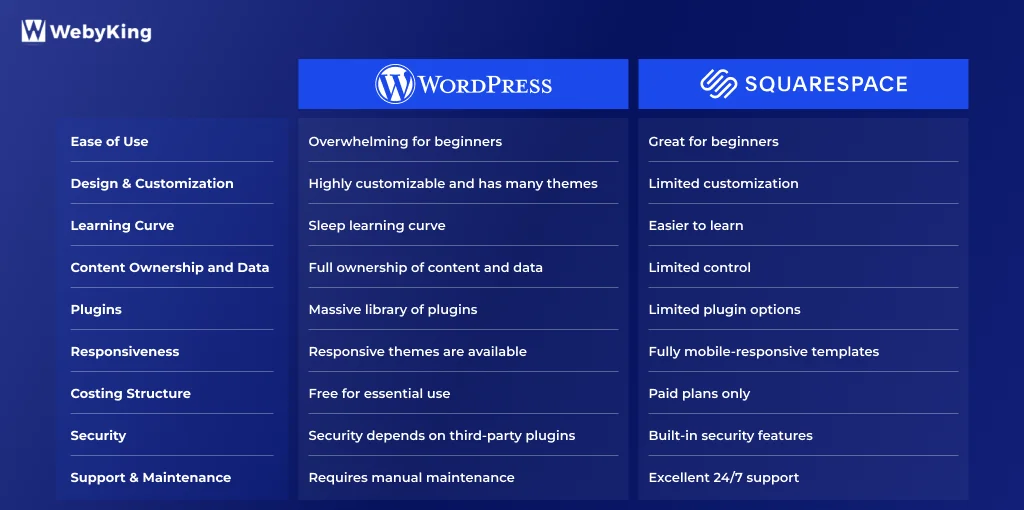
When it comes down to it, the choice between WordPress and Squarespace boils down to what you value most in a website builder.
- Choose WordPress if you want total control, flexibility, and the ability to create a fully customized website. It’s the best choice if you’re comfortable with a bit of a learning curve and want the freedom to do anything you can imagine.
- Choose Squarespace if you prefer simplicity and don’t want to worry about technical details like security and maintenance. Its ease of use and stunning designs make it an excellent option for anyone who needs a professional site without the fuss.
To help budding entrepreneurs stand out in a crowded market, we at WebyKing solely design and develop unique WordPress websites. In addition to creating visually appealing websites, we use SEO best practices to ensure that your website is optimized for long-term success.
Frequently Asked Questions
Is WordPress better than Squarespace?
Indeed, WordPress offers greater freedom and flexibility to create any type of website, making it superior to Squarespace.
Although Squarespace is user-friendly, its capabilities and flexibility are restricted and free. Platforms like Wix and Weebly, which are also fully hosted site builders with comparable restrictions, are equivalent.
How can I move to WordPress from Squarespace?
Squarespace offers limited migration options, but you can still move from Squarespace to WordPress. See our tutorial on eCommerce platform migration for step-by-step instructions.
Which is more SEO-friendly, Squarespace or WordPress?
Both Squarespace and WordPress have SEO features. WordPress offers comprehensive SEO customization and optimization options with plugins like Yoast SEO. Although Squarespace’s built-in SEO capabilities are easy to utilize, they might not be as thorough as WordPress’s. Because of its high degree of customization, WordPress offers an advantage for more complex SEO requirements.
Is it worthwhile to use the WooCommerce plugin?
You can add eCommerce capability to your website for free using WooCommerce. You can have an online store in minutes with just a few clicks.
Enjoy everything, including product placement, credit card payments, payment gateways, etc. Creating an online store for your WordPress website with WooCommerce has never been easier.
Is Squarespace good for blogging?
Yes, Squarespace could work well for essential blogging. It has user-friendly interfaces and built-in features such as scheduling or commenting. However, advanced blogging features or customization can only be enjoyed in WordPress.
Whether you’re upgrading technology, improving performance, or rebranding your business, this checklist ensures a smooth and successful migration every step of the way. Get Your Free Checklist Now!

Ravi Makhija, the visionary Founder and CEO of WebyKing, is a seasoned digital marketing strategist and web technology expert with over a decade of experience. Under his leadership, WebyKing has evolved into a premier full service web and marketing agency, delivering innovative solutions that drive online success. Ravi’s deep understanding of the digital landscape combined with his passion for cutting-edge technologies empowers him to consistently exceed client expectations and deliver results that matter.


